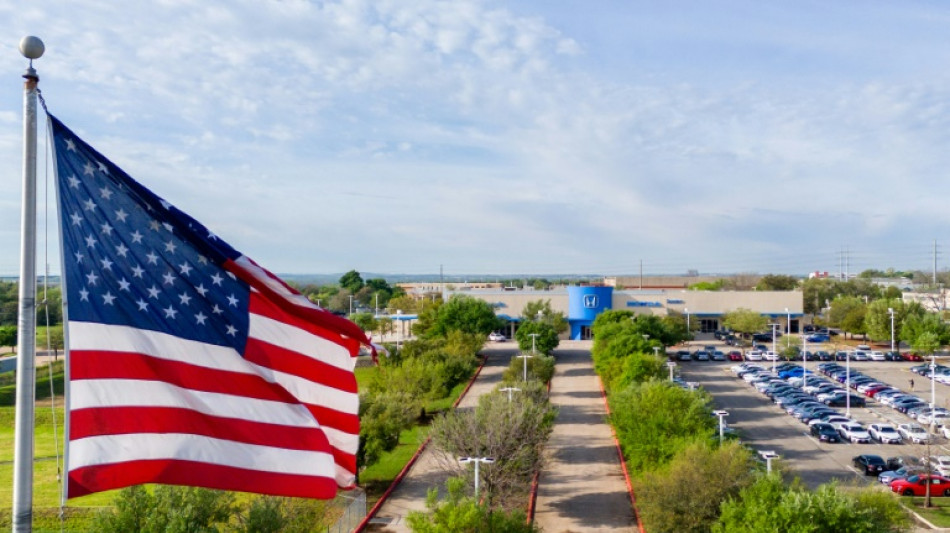
-
 Australia's Mary Fowler set for long lay-off after ACL injury
Australia's Mary Fowler set for long lay-off after ACL injury
-
Rubio to meet French leaders for talks on Ukraine
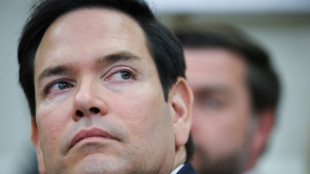
-
 Webb spots strongest 'hints' yet of life on distant planet
Webb spots strongest 'hints' yet of life on distant planet
-
Arteta's Arsenal come of age with Madrid masterclass

-
 None spared in Nigeria gun, machete massacre: survivors
None spared in Nigeria gun, machete massacre: survivors
-
'No problem' if Real Madrid replace me: Ancelotti

-
 Inter dreaming of treble glory after reaching Champions League semis
Inter dreaming of treble glory after reaching Champions League semis
-
'No limits' for treble-hunting Inter, says Pavard

-
 Inter off Bayern to reach Champions League last four
Inter off Bayern to reach Champions League last four
-
Rice 'knew' Arsenal would dethrone Real Madrid

-
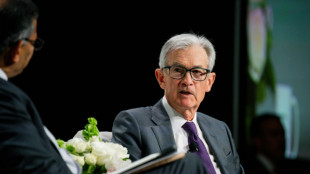 US stocks fall with dollar as Powell warns on tariffs
US stocks fall with dollar as Powell warns on tariffs
-
Arsenal oust holders Real Madrid to reach Champions League semis

-
 Arsenal defeat Real Madrid to reach Champions League semis
Arsenal defeat Real Madrid to reach Champions League semis
-
AMD says US rule on chips to China could cost it $800 mn
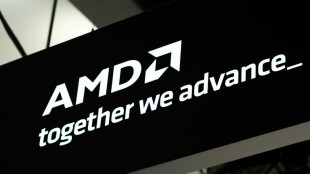
-
 Inter hold off Bayern to reach Champions League last four
Inter hold off Bayern to reach Champions League last four
-
El Salvador rejects US senator's plea to free wrongly deported migrant
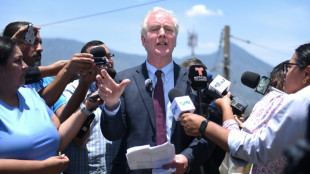
-
 Newcastle thrash Crystal Palace to go third in Premier League
Newcastle thrash Crystal Palace to go third in Premier League
-
Zuckerberg denies Meta bought rivals to conquer them

-
 Starc stars as Delhi beat Rajasthan in Super Over
Starc stars as Delhi beat Rajasthan in Super Over
-
Weinstein asks to sleep in hospital, citing prison 'mistreatment'
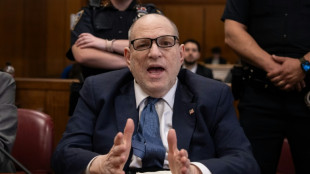
-
 Amorim asks McIlroy to bring Masters magic to Man Utd
Amorim asks McIlroy to bring Masters magic to Man Utd
-
Ruud keeps Barcelona Open defence on course

-
 Trump tariffs could put US Fed in a bind, Powell warns
Trump tariffs could put US Fed in a bind, Powell warns
-
CONCACAF chief rejects 64-team World Cup plan for 2030
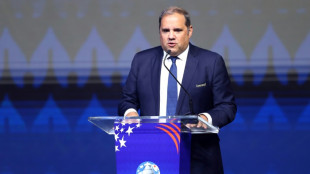
-
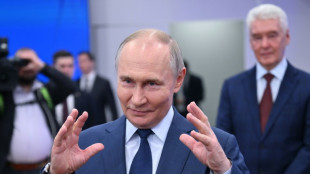 Putin praises Musk, compares him to Soviet space hero
Putin praises Musk, compares him to Soviet space hero
-
Son to miss Spurs' Europa League trip to Frankfurt

-
 US senator in El Salvador seeking release of wrongly deported migrant
US senator in El Salvador seeking release of wrongly deported migrant
-
Trump tariffs could put the US Fed in a bind, Powell warns

-
 US judge says 'probable cause' to hold Trump admin in contempt
US judge says 'probable cause' to hold Trump admin in contempt
-
India opposition slams graft charges against Gandhis

-
 Nate Bargatze to host Emmys: organizers
Nate Bargatze to host Emmys: organizers
-
US Fed Chair warns of 'tension' between employment, inflation goals

-
 Trump touts trade talks, China calls out tariff 'blackmail'
Trump touts trade talks, China calls out tariff 'blackmail'
-
US judge says 'probable cause' to hold govt in contempt over deportations

-
 US eliminates unit countering foreign disinformation
US eliminates unit countering foreign disinformation
-
Germany sees 'worrying' record dry spell in early 2025

-
 Israel says 30 percent of Gaza turned into buffer zone
Israel says 30 percent of Gaza turned into buffer zone
-
TikTok tests letting users add informative 'Footnotes'

-
 Global uncertainty will 'certainly' hit growth: World Bank president
Global uncertainty will 'certainly' hit growth: World Bank president
-
EU lists seven 'safe' countries of origin, tightening asylum rules

-
 Chelsea fans must 'trust' the process despite blip, says Maresca
Chelsea fans must 'trust' the process despite blip, says Maresca
-
Rebel rival government in Sudan 'not the answer': UK

-
 Prague zoo breeds near-extinct Brazilian mergansers
Prague zoo breeds near-extinct Brazilian mergansers
-
Macron to meet Rubio, Witkoff amid transatlantic tensions

-
 WTO chief says 'very concerned' as tariffs cut into global trade
WTO chief says 'very concerned' as tariffs cut into global trade
-
Sports bodies have 'no excuses' on trans rules after court ruling: campaigners

-
 Zverev joins Shelton in Munich ATP quarters
Zverev joins Shelton in Munich ATP quarters
-
The Trump adviser who wants to rewrite the global financial system
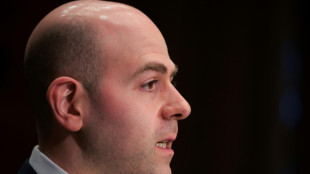
-
 US senator travels to El Salvador over wrongly deported migrant
US senator travels to El Salvador over wrongly deported migrant
-
UN watchdog chief says Iran 'not far' from nuclear bomb


US auto industry stunned by tariffs meant to save it
The 25 percent tariffs on automobiles announced by President Donald Trump are meant to revitalize American industry, but Detroit's giants were stunned Thursday by their scale and faced a beating on Wall Street.
While the implementation of the tariffs had been anticipated for weeks, their details surprised manufacturers and experts as the levies will not only apply to imports of finished vehicles but parts as well.
That will be particularly painful because the sector relies on a complex global supply chain, sometimes involving multiple border crossings, with assembly in one country of parts manufactured in others.
The levies kick in April 3 at 04:01 GMT, according to the decree signed by the Republican president on Wednesday.
The manufacturing process at Ford and General Motors depends largely on a highly complex back-and-forth between the United States, Mexico, and Canada -- the three countries linked by the USMCA, a free trade agreement signed by Trump during his first term.
However, Trump's decree doesn't provide exemptions for imports under USMCA, dashing industry hopes that car parts would be spared.
The tariffs include "crucial parts" -- engines, transmissions, powertrains, and electrical components are on the list that could be expanded.
Parts not originally manufactured in the United States will face 25 percent tariffs just like finished foreign vehicles.
The White House noted that of the 16 million new vehicles sold in the United States last year, half were assembled in the country but contained only 40-50 percent American-made components.
It also said the trade deficit for automotive parts was $93.5 billion.
Stock Market Decline
Manufacturers faced a drubbing in the stock market Thursday.
General Motors plummeted 7.3 percent, while Ford closed down 3.8 percent and Stellantis 1.2 percent.
US listed shares of Toyota and Honda fell by 2.8 percent and 2.7 percent, respectively.
According to JPMorgan analysts, 82 percent of vehicles sold by Ford are produced in the United States, ahead of Stellantis (71 percent), Honda (68 percent), Toyota (57 percent), and General Motors (53 percent).
Trump's decree demands that manufacturers determine the percentage between US parts and foreign parts in components or finished vehicles entering the United States, with the 25 percent tariff imposed only on foreign-made parts.
This presents a real challenge for manufacturers -- who will be penalized for incorrect allocations -- but also for the authorities to track them.
An implementation delay has therefore been granted, allowing the Commerce Department time to figure out how to proceed.
According to JPMorgan, once tariffs are collected across the entire intended scope, they would generate $82 billion annually.
Trump claimed Wednesday that they would bring in "more than $100 billion."
JPMorgan estimated that the largest tariff bill would be paid by GM ($13 billion) while Ford should pay around $4.5 billion.
Experts have no doubt that there will be a price increase for new vehicles in the United States, which will subsequently affect a weakened used car market as owners keep their vehicles longer.
The president's goal is to increase manufacturing in the United States, but relocating factories or reconfiguring a supply chain cannot happen overnight.
Foreign nations have also threatened retaliatory measures which could further impact the sector.
In the meantime, manufacturers will have to decide between fully passing on the additional cost to the end consumer, cutting into their margins, or a mix of both.
The cost of an affected new vehicle could increase by 9-12 percent, or $4,000 to $5,300, JPMorgan anticipates.
"With added cost pressures, automakers may pull back on incentives, which could make it more difficult for some consumers to find affordable options," said Jessica Caldwell from Edmunds.
According to Caldwell, insurance premiums should also increase due to inflation in spare parts costs.
G.Frei--VB
